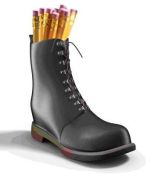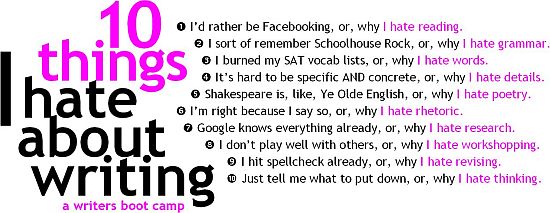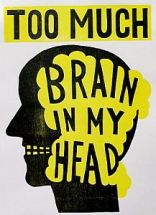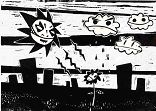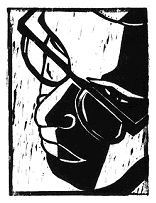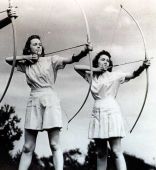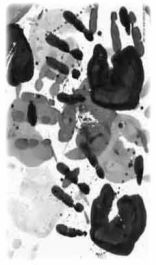|
ENGL 281 D Download the PDF version of the course policies and syllabus.
"I am going to be rather hard-nosed and say that if you have to find devices to coax yourself to stay
focused on writing, perhaps you should not be writing what you’re writing. And if this lack of motivation
is a constant problem, perhaps writing is not your forte. I mean, what is the problem? If writing bores
you, that is pretty fatal. If that is not the case, but you find that it is hard going and it just doesn't
flow, well, what did you expect? It is work; art is work." |
JOHN MCPHEE, Pulitzer Prize winner and grandmaster of literary nonfiction, said about writing, "The first draft [is] an unreadable thing. And you would not want to show it to anybody because it’s just full of entrails hanging out with loose ends…You belch it all out on paper. When you’ve got something on paper, you then have something to work with...and turn into a piece of writing." Writing is all about guts, gas, gross anatomy, and getting down to business. Writing isn't a check mark, a destination vacation, a graduation requirement. Rather, it's a practice, a process, an extreme sport. This course will take up McPhee’s writer's heroic journey--from unreadable thing to piece of writing--by engaging what it means to be a good writer, reader, and researcher, how to recognize and develop the skills and strategies to write, read, and research, and why good writing, reading, and researching are central to everything you do. Be prepared for a quarter of high-impact, low-stake, high-risk, creativity-freeing, genre-tripping, word-playing, workshop-intensive writing, reading, and thinking. This will be hard, but it will be fun. You will hate it, but you will grow to love it. We will trek, tromp, jump, crunch, sweat, and swear through academic, expository, persuasive, and creative writing challenges. We will set high goals and meet tough benchmarks. We will hone the tools and muscles you already have and push, stretch, and dream till you’re one lean, mean writing machine. Are you ready? Let’s do this.OUR ENGLISH 281 PROMISES a quarter of writing, reading, discussion, library research, asking questions, more writing, revision, more reading, more discussion, critical thinking, analysis, fun, and even more writing and revision. It is a writing boot camp after all. We will engage texts and writing tasks small and large, everyday and academic. This particular incarnation of 281 also promises a healthy inclusion of popular culture, cultural studies, politics, everyday activism, media old and new, and experiential learning. You must have a well-developed curiosity about the world. Through all of these things, you will further practice the principles behind exposition, arguments, evidence, and analysis; you will hone strategies and skills for genre, style, revision, workshopping, and research. Texts may include in whole or in excerpt: John McPhee, Amy Tan, Sherman Alexie, Shelley Jackson, Shirley Jackson, Annie Proulx, Ray Bradbury, Langston Hughes, Patricia Smith, William Shakespeare, Anthony Bourdain, Gael Greene, Michael Pollan, Michael Olmert, David Bartholomae, Geoffrey Sirc, Keywords for American Cultural Studies, and others.
THIS COURSE ASSUMES that you have previous experiences in college-level
writing (such as
ENGL 109/110, 111, 121, or 131
or equivalent), as we will be building on those skills and techniques begun in your introductory courses.
With that in mind, this class also takes as a basic assumption that writing is a skill and that,
like any skill, it can always be furthered and improved through guided practice and experimentation.
We will work to develop, challenge, and enhance the writing skills you already possess into the skills
and intuitions necessary for academic, professional, and creative "readable things."
|
"To write is to write is to write is to write is to write is to write is to write is to write."
Required Course Texts & Materials
• ENGL 281D Course Reader (available at Ave Copy, 4141 Univ. Way NE @ 42nd) |
|
"The world I create in writing compensates for what the real world does not give me."
"Imagination is more important than knowledge."
"An idea that is not dangerous is unworthy of being called an idea at all." |
English 281 Course Outcomes1. To produce complex written, oral and/or multimedia work that responds to the contexts and conventions of specific genres.
• The work demonstrates a sense of purpose within the selected genre; the author understands how his or her
work functions in a particular generic context. 2. To read, analyze, and synthesize sources from various genres and purposefully incorporate appropriate evidence to generate and support work and communication.
• The work demonstrates an understanding of the course texts as necessary for the purpose at hand. 3. To develop flexible strategies for revising, editing, and proofreading writing.
• The author understands that soliciting, offering, and responding to feedback is essential to the
process of making substantial and successful revision. |
|
|
Course Requirements
Writing Challenges (40%)
"I hate writing; I love having written."
"I always advise children who ask me for tips on being a writer to read as much as they possibly
can. Jane Austen gave a young friend the same advice, so I’m in good company there."
"For me to do a story, something has to happen to someone. It’s a story in the way you learn
what a story is in third grade, where there is a person and things happen to them and then something
big happens and they realize something new." |
Requirements & GradingYour grade should not be the sole exigence or motivation for this class. It is the hope of the course that you walk away from English 281 with something more. Find some pleasure and some edification and some knowledge from this class (or any class really) and success is usually not far behind. With that in mind, your grade will be a reflection of engagement, effort, close reading, critical thinking, writing, revision, and participation. Writing Challenges/Short Papers (40%) The majority of the writing you will do for this class is in the form of short, critical, and well-conceived papers. Each week you will be given a "writing challenge," a particular writing task to accomplish in 1 to 4 pages. Writing challenges focus on specific skills, forms, genres, and ideas to work out particular writing muscles and habits. From personal narrative to close reading to poetry to interview to research proposal, these short papers will be graded on clarity, coherence, analysis, concision, and how well they satisfy the assignment. Writing Challenges are due weekly, but you need only complete a minimum of 7; some challenges are required. See the Writing Challenge/Short Paper prompt for more details. Major Paper (20%) All of your hard work during the quarter will culminate in a 6 to 8 page extended exposition or research paper. In other words, you will select a topic, problem, or question to write about in an extended, evidenced piece. In fact, one of the quarter’s writing challenges, about mid term, will be a research proposal identifying and outlining your major paper’s topic, argument, and evidence. The major paper asks you to think critically about the goals of the class, to research and make connections, and to put all of the quarter’s skills into actual practice. See the Major Paper prompt for more details. Final Portfolio (10%) The capstone of your writing boot camp will be your final portfolio, your honed and toned body of work. The final portfolio will include: all of your revised Writing Challenges, your Major Paper, and a cover letter that explains how the portfolio demonstrates the goals and outcomes for the course. The cover letter, in fact, is the final week’s Writing Challenge. Your portfolio will be graded on completeness, organization, revision, and presentation. A portfolio that does not include all the above will be considered incomplete. Participation and Preparedness (30%) Preparedness and participation forms a large component of your final grade. It is essential that you prepare for class, attend class, and participate. Missing class may seriously compromise your ability to do well in this class. Again, negative participation will hurt your participation grade. Participation is determined by 1) your respectful presence in class, 2) your willingness to discuss, comment, and ask questions, 3) your preparation for class, which includes bringing required materials to class and doing all of the assigned reading for class, 4) your engagement in workshopping and group work, 5) your use of the class blog, 6) and your interactions with me and other students. Beyond the written assignments, you will participate in the class web log. Please bookmark the blog address https://catalysttools.washington.edu/gopost/board/changed/12201/, check the site regularly, and feel free to comment and post regularly. The class blog will be used for announcements, assignment reminders, updates to the syllabus, as well as questions, inquiries, provocations, and an extension of in-class discussion. Blog commenting and posting will be taken into account in evaluating class participation.
Finally, at least once during the quarter, you are required to sign-up for
workshopping your writing.
Each week, select students will share their work with the class, and the class as a whole will
respectfully comment, critique, and make suggestions about each workshop draft. For your chosen week,
you will be responsible for completing a draft of the assignment early, for making copies for the
class, and for actively participating in your workshop. Missing your workshop will significantly
affect your overall participation grade.
|
Download the PDF version of the course policies and syllabus.
|
|
"Suit the action to the word, the word to the action." |
AttendanceAttendance is strongly recommended. If you are absent, you miss the explanation of an assignment, an in-class exercise or workshop, the discussion of a reading, and overall, the class as a community of learning. It is in your best interests to come to class. Also, you are expected to be in class on time. Class will start immediately at the appointed time. In the first minutes of class I may make important announcements, establish the agenda for the class meeting, begin immediately with an important lesson, or field questions. Therefore, it is particularly important for you to arrive on time, especially for a fifty-minute class. If you come in after I start class, even by only a few minutes, you are late and I will mark you as such.
Chronic or conspicuous attendance problems
will negatively affect your class participation grade. If you know you are going to miss
class, please let me know ahead of time (via email), provide any pertinent documentation,
and we will make any necessary arrangements. And when you do miss class, always find
another student to get class notes and see me in order to make up missed work in a
timely manner. If you miss a great deal of the quarter, you are recommended strongly to
take the course during a quarter in which you can more easily attend class.
|
"You can't wait for inspiration. You have to go after it with a club."
|
|
Response Paper Formatting 1) 1" margins top, bottom, left, and right on each page. 2) Double-spaced block header with your name, date, course, my name. Some specific assignments may be single-spaced. 3) Appropriate title. 4) Standard Times Roman Font, 12 point only. 5) Number all pages except for the first page in the top right-hand corner. 6) Correct MLA citation and bibliographic format. Bibliography if necessary. 7) Stapled once at the top left corner. For further details, see the response paper prompt assignment sheet. |
Assignment FormatAll papers must be typed or produced on a word processor. Word processing is preferable because it makes the mechanics of revision -- rearranging, adding, and deleting -- easy. If you do not have your own computer with word processing capability, computer labs are available on campus with a variety of software that is easy to learn. All documents should be saved in Microsoft Word format, preferably in Word format; if you do not have access to Word, then save your documents in RTF or Rich Text Format. All papers must follow the manuscript format outlined by the assignment. All papers must use MLA citation and documentation conventions. All papers must be neatly printed (in black), stapled in the top, left-hand corner if necessary, and not be three-hole punched. Papers that do not follow these format guidelines will not be accepted. They will be returned unread to you. Papers will be regarded as late until they are resubmitted in the proper format. Always make a backup copy of every paper you turn in, lest you be one of the unhappy people whose paper is eaten by the computer. You may even want to take the precaution of e-mailing your paper to yourself as an attachment at least a couple of times during the drafting process and certainly BEFORE you exit the document for the last time and leave the computer lab, your friend's computer, or even your own computer. This way, even if you lose your disc or your paper gets mysteriously erased, you still have a copy in your e-mail files.
Evaluation RubricOver the course of the quarter, your assignments will receive feedback and comments that will identify what you are doing well and what still needs improvement. Your grades assess your fulfillment of the assignment, the quality of work, detail, analysis, and argumentation, overall effort, and finally, style, polish, and risk taking. Consider the following evaluation rubric as signposts or a kind of legend to your progress and evaluation:
• Outstanding (3.7-4.0): Offers a very highly proficient, even memorable demonstration
of the trait(s) associated with the course or assignment goal(s), including some
appropriate risk-taking and/or creativity. |
Late Assignments All assignments must be done completely and turned in on time. Lateness will subtract from your assignment's final grade and work must be turned in as soon as possible. Note that I will not comment on late work. However, you still need to complete late work for a complete portfolio. If you miss class on the due date of a paper, you must notify me and make arrangements to get the paper to me as soon as possible. Unless previously arranged, I do not accept assignments via email. Furthermore, all work must be seen and checked by my to be eligible for your final project! Remember that a paper has not been officially handed in until it is in my hands. Never turning anything in late is always the best policy. |
|
Contact Ed
Office: Download the PDF version of the course policies and syllabus.
"It is the supreme art of the teacher to awaken joy in creative expression and knowledge." |
Finding HelpMy office and office hours are listed at the front of the course policies. I am available during that time and by appointment to help you. I encourage you to come see early in the quarter even if it is just to talk about the class, about the assignments, or about school in general. I may ask you to meet with me when I think a conference would be useful. My office is located in the ground floor of Padelford Hall (northeast of the HUB), Room B-33. See http://www.washington.edu/home/maps/northcentral.html?pdl.
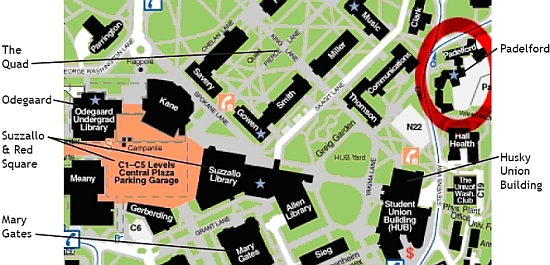
I am also available electronically by email and the course blog. Email and the blog are the best means of contacting me. I will do my best to answer your emails and blog posts, usually within twenty-four hours. If there is an emergency and you need to reach me, please contact the Undergraduate English office in A-2H&G Padelford. Furthermore, when time permits, I will supplement my office hours with virtual hours via AOL Instant Messenger or Google Talk (nickname: EDagogy); if I am logged in, during reasonable hours, you are more than welcome to discuss the class or ask questions. Please, when you initiate an IM conversation for the first time, please identify yourself to me; also, be patient because my responses may not be immediate. You can find additional writing help at the Odegaard Writing and Research Center (OWRC), which is a good resource for this class and other classes. OWRC is located on the third floor of Odegaard Library and offers a variety of services including help with papers, brainstorming ideas, help with reading, and research. See http://depts.washington.edu/owrc/ for more information. Moreover, the Center for Learning and Undergraduate Enrichment (CLUE) is also a good resource. CLUE is located in Mary Gates Hall Commons and offers tutorial sessions for most freshman lecture courses, skills courses, access to computer labs, and drop-in centers for math, science and writing. See http://depts.washington.edu/clue/ for more information.
Further resources, both on- and off-campus can be found on the Links page of the course website:
http://staff.washington.edu/changed/281/links.html.
|
"I believe more in the scissors than I do in the pencil."
"12 Steps for Making Art:
|
|
"If you do all that work of figuring out exactly how writing is done, then it's available to you at
anytime, and you can build on it. It's like the difference between shooting one hoop and having it
go in by accident and saying later, 'I shot a basket,' -- and practicing so much you can do it
whenever you want."
"You will have to write and put away or burn a lot of material before you are comfortable in this medium.
You might as well start now and get the work done. For I believe that eventually quantity will make for
quality." |
Academic DishonestyPlagiarism, or academic dishonesty, is presenting someone else's ideas or writing as your own. In your writing for this class, you are encouraged to refer to other people's thoughts and writing -- as long as you cite them. Many students do not have a clear understanding of what constitutes plagiarism, so feel free to ask questions about these matters at any time. Plagiarism includes:
• a student failing to cite sources of ideas If you have any doubt about how to cite or acknowledge another's writing, please talk to me. It is always better to be safe than sorry. As a matter of policy, any student found to have plagiarized any piece of writing in this class will be immediately reported to the College of Arts and Sciences for review. For further information, please refer to UW's Student Conduct Code at http://www.washington.edu/students/handbook/conduct.html. Play it smart, don't plagiarize!
AccommodationsIf you have a registered disability that will require accommodation, please see me immediately. If you have a disability and have not yet registered it with Disability Resources for Students in 448 Schmitz Hall, you should do so immediately. Please contact DRS at 206-543-8924 (Voice) or 206-543-8925 (V/TTY) or 206-616-8379 (FAX) or via their website at http://www.washington.edu/admin/ada/dss.htm. I will gladly do my best to provide appropriate accommodation you require.
UW SafeCampusPreventing violence is everyone’s responsibility. If you're concerned, tell someone. For more information visit the SafeCampus website at http://www.washington.edu/safecampus and keep the following in mind:
• Always call 911 if you or others may be in danger. |
"I'm a great believer in luck, and I find the harder I work the more I have of it."
"Don't ever dare to take your college as a matter of course -- because, like democracy and freedom,
many people you'll never know have broken their hearts to get it for you." |
|
|
© 2007-10 Edmond Chang. All original material. All rights reserved. Email the webmaster of this site. These pages are best viewed with Mozilla Firefox or Internet Explorer. Open your browser to the largest viewable area. These pages are hosted by the University of Washington Computing & Communications system. |
|
